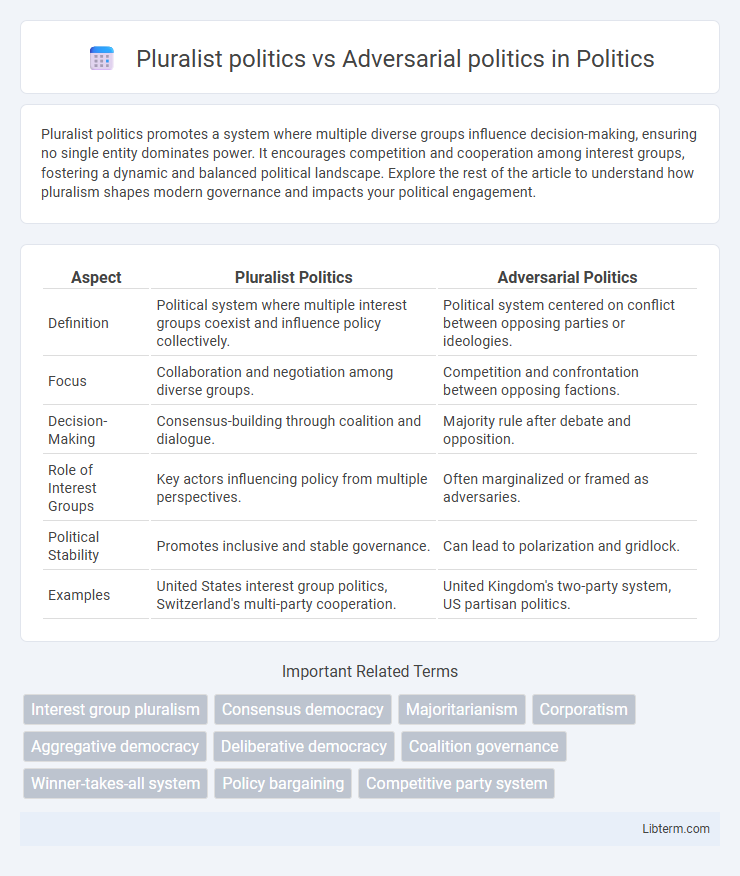Pluralist politics promotes a system where multiple diverse groups influence decision-making, ensuring no single entity dominates power. It encourages competition and cooperation among interest groups, fostering a dynamic and balanced political landscape. Explore the rest of the article to understand how pluralism shapes modern governance and impacts your political engagement.
Table of Comparison
| Aspect | Pluralist Politics | Adversarial Politics |
|---|---|---|
| Definition | Political system where multiple interest groups coexist and influence policy collectively. | Political system centered on conflict between opposing parties or ideologies. |
| Focus | Collaboration and negotiation among diverse groups. | Competition and confrontation between opposing factions. |
| Decision-Making | Consensus-building through coalition and dialogue. | Majority rule after debate and opposition. |
| Role of Interest Groups | Key actors influencing policy from multiple perspectives. | Often marginalized or framed as adversaries. |
| Political Stability | Promotes inclusive and stable governance. | Can lead to polarization and gridlock. |
| Examples | United States interest group politics, Switzerland's multi-party cooperation. | United Kingdom's two-party system, US partisan politics. |
Understanding Pluralist Politics
Pluralist politics emphasizes the role of multiple interest groups competing to influence policy, ensuring no single entity dominates political decision-making. It highlights the dispersion of power across various organizations, encouraging democratic participation and compromise among diverse groups. Understanding pluralist politics involves recognizing how these interactions create a dynamic policymaking environment that contrasts with the zero-sum nature of adversarial politics.
Defining Adversarial Politics
Adversarial politics centers on conflict and competition between opposing parties, emphasizing ideological division and power struggles within democratic systems. It contrasts with pluralist politics, which advocates for multiple interest groups cooperating to influence policy, promoting inclusivity and negotiation. Defining adversarial politics involves understanding its focus on zero-sum interactions that often prioritize winning over consensus-building.
Core Principles of Pluralism
Pluralist politics centers on the core principle that multiple groups with diverse interests coexist and compete peacefully within a democratic framework, ensuring no single entity monopolizes power. It emphasizes decentralized decision-making, where influence is distributed among various stakeholders such as lobbyists, interest groups, and civil society organizations, fostering negotiation and compromise. This approach contrasts adversarial politics by promoting cooperation and consensus-building as essential for effective governance.
Key Characteristics of Adversarial Systems
Adversarial politics is characterized by intense competition between clearly defined parties, often marked by sharp ideological divides and conflict-driven discourse. This system emphasizes zero-sum outcomes where political gains by one party come at the expense of another, fostering polarization and strategic maneuvering. Key features include dominance of two major parties, frequent government-opposition clashes, and a tendency toward confrontation over consensus.
Historical Development of Both Models
Pluralist politics originated in the early 20th century, emphasizing the role of multiple interest groups competing within a democratic framework to influence policy without centralized domination. Adversarial politics, closely associated with the rise of mass political parties and ideological polarization in the mid-20th century, highlights conflict between opposing political forces as central to democratic engagement. Both models evolved alongside industrialization and urbanization, reflecting changing social structures and demands for political representation.
Decision-Making Processes Compared
Pluralist politics features decision-making processes that emphasize negotiation and compromise among multiple interest groups, allowing diverse voices to influence policy outcomes collaboratively. Adversarial politics relies on competitive, often polarized, interactions between opposing parties, where decision-making is driven by conflict and zero-sum strategies. Pluralist mechanisms foster inclusivity and consensus-building, whereas adversarial systems prioritize victory and clear party distinctions during policy formulation.
Impacts on Policy Outcomes
Pluralist politics encourages diverse interest groups to influence policy outcomes, often resulting in more balanced and inclusive decision-making that reflects a wide range of societal interests. Adversarial politics typically leads to polarized policy outcomes, as competing parties prioritize partisan goals over collaborative solutions, potentially causing gridlock or skewed policies favoring dominant factions. Research shows that pluralist systems enhance policy responsiveness and innovation, whereas adversarial systems may hinder effective governance and long-term policy stability.
Strengths and Weaknesses of Pluralist Politics
Pluralist politics excels in representing diverse interests through multiple competing groups, facilitating broader participation and preventing dominance by a single faction, which strengthens democratic inclusivity. However, its weaknesses include potential policy gridlock due to conflicting demands and the tendency for well-funded interest groups to exert disproportionate influence, undermining equal representation. This dynamic can dilute accountability and complicate decisive policy-making within the political system.
Critiques of Adversarial Politics
Adversarial politics often faces criticism for fostering polarization and hindering consensus-building in democratic systems. Critics argue that its zero-sum nature prioritizes winning over collaborative problem-solving, which may undermine policy effectiveness and public trust. In contrast, pluralist politics emphasizes diverse interest representation and negotiation, aiming to balance conflicting demands through inclusive dialogue.
Future Trends in Political Systems
Pluralist politics emphasizes diverse interest groups cooperating within democratic institutions, predicting increased digital platforms for multi-stakeholder engagement in future political systems. Adversarial politics centers on conflict between opposing parties, with trends indicating rising polarization amplified by social media algorithms and identity-driven campaigns. Emerging hybrid models may blend pluralist inclusivity with adversarial competition to balance cooperation and contestation in evolving governance frameworks.
Pluralist politics Infographic

 libterm.com
libterm.com